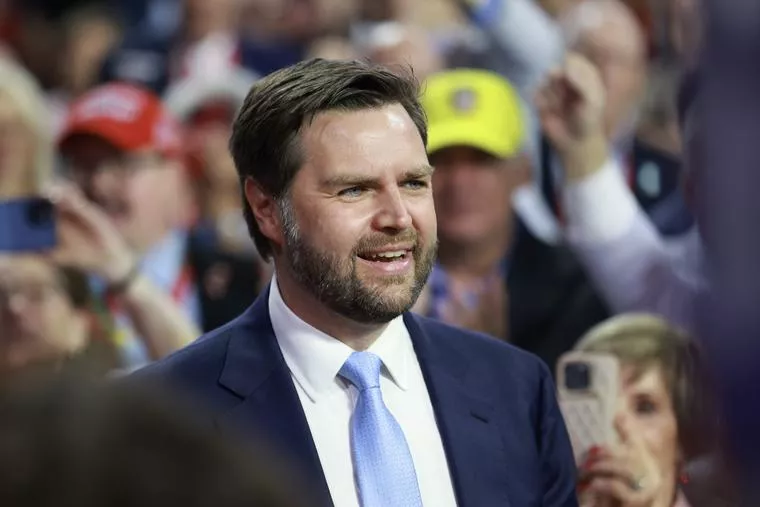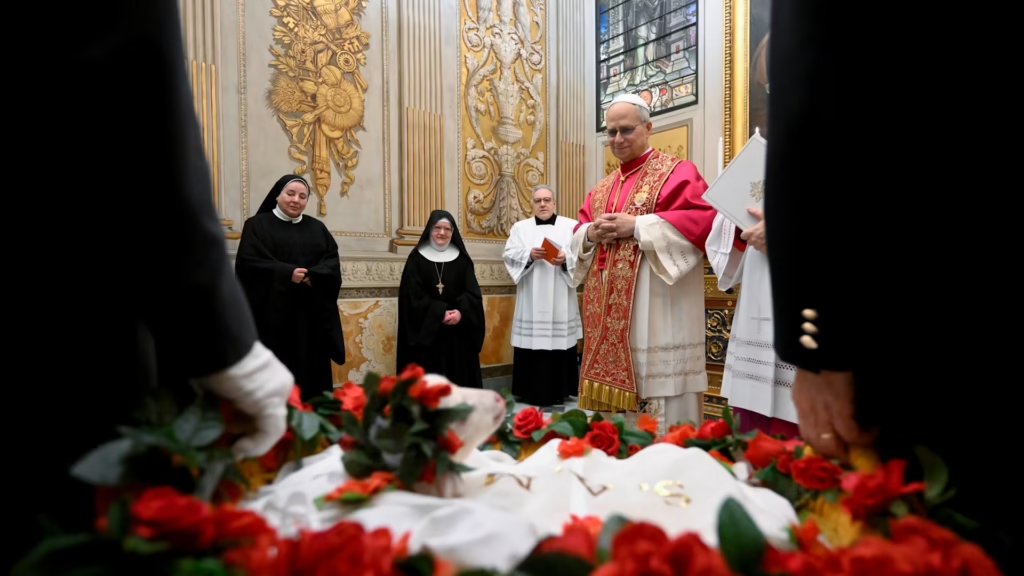The Catholic senator from Ohio shares presidential nominee’s more populist views on a number of key issues, including economics, abortion and foreign policy.
By Peter Laffin
Former president Donald Trump’s ambition of remaking the Republican Party in his image just took a major leap forward with the selection of Sen. J.D. Vance, R-Ohio, a Catholic convert, as his vice-presidential nominee.
Following months of “veepstakes” speculation, Trump’s choice of the 39-year-old former U.S. Marine signals a number of significant policy shifts within the GOP. Like Trump, Vance favors a more populist approach on economics, a “softer” stance on abortion, and a more isolationist foreign policy.
“After lengthy deliberation and thought, and considering the tremendous talents of many others, I have decided that the person best suited to assume the position of Vice President of the United States is Senator J.D. Vance of the Great State of Ohio,” Trump posted on Truth Social.
Vance is scheduled to address the Republican National Convention in Milwaukee Thursday night.
News of Trump’s choice prompted a range of reactions from Catholic observers.
In response to the pick, Elbridge Colby, the Catholic former deputy assistant secretary of defense for strategy and force development, posted his jubilation on X: “An absolutely superb, visionary choice by President Trump of @JDVance1. America could not be more fortunate. We are finally primed for putting Americans first again — for real! It can’t come soon enough.”
According to Kevin Roberts, president of the Heritage Foundation, Vance’s greatest attribute is his deep commitment to the Catholic faith.
“Vance is an extremely serious Roman Catholic,” Roberts told the Register. “That should excite Catholics and other people of faith. Of all the things that strike me about his attributes, his authenticity is at the top of the list. The vast majority of Americans will really come to love him and his family.”
But for Lila Rose, president and founder of Live Action, the Vance VP selection was cause for concern.
«Both J.D. Vance and President Trump support the legalization of abortion pills,» she wrote on X. «This is heartbreaking and wrong. Vance once strongly opposed the murder of all pre-born babies. Both men can still change their positions, and we will pray and work for them to do so.
Policies Signal GOP Shift
In his short stint in the Senate, Vance has often stood athwart the kind of free-market conservatism that has long defined the GOP. In 2023, he co-sponsored a bill with Sen. Elizabeth Warren, D-Mass., that cracked down on unbridled risk-taking by big banks by imposing new restrictions on executive pay.
He has even issued praise for President Joe Biden’s Federal Trade Commission Chair Lina Khan for blocking numerous business mergers, which Vance said would “allow consumers to have the right choices.”
Vance has attributed his willingness to embrace government programs designed to aid the poor to his difficult childhood in rural Middletown, Ohio, in which he experienced extreme poverty, domestic abuse and drug addiction.
His 2016 best-selling memoir, Hillbilly Elegy: A Memoir of a Family and Culture in Crisis, explores the socioeconomic conditions of the white working class through social research and his family’s story. The book, which was adapted into a 2020 feature film by Ron Howard, catapulted Vance into the public spotlight and eventually into the U.S. Senate.
The selection of Vance as Trump’s running mate stands to improve the ticket’s standing in the all-important Midwest battleground states, where Vance is a known entity. Most expert observers believe that Pennsylvania, Michigan and Wisconsin will be the essential “tipping-point” states this November. Vance will likely be dispatched to his home region frequently to make the case for a second Trump term.
Sam Brownback, who served as U.S. ambassador-at-large for international religious freedom during the Trump administration, and who, like Vance, is a convert to Catholicism, told the Register that Vance is a good pick who will help Trump regain the White House.
“He is young, intelligent and keen on policies that help working-class families,” said Brownback, a Republican and a former Kansas governor and U.S. senator, by text. “He will be a big help in winning the industrial states of Pennsylvania, Ohio, Wisconsin and Michigan. The old Democrat ‘Blue Wall’ is gone.”
Vance’s youth is also thought to be a potential benefit for a Trump campaign seeking to capitalize on recent polling that shows an uptick in support for Trump among voters between the ages of 18 and 29. A recent New York Times/Siena poll found Trump leading this cohort by 8 points. In 2020, Biden led Trump in this group by 20 points.
“Great VP pick,” remarked Catholic writer Michael Brendan Dougherty on X. “Finally ditching the most brain-dead ideologies that have been dragging the party down, and finally a candidate in touch with issues that actually affect people under 40 years old.”
Trump and Vance, who are 39 years apart in age, would represent the largest age gap between any presidential and vice-presidential candidates in history. The previous record was the 2008 Republican ticket that featured a 28-year difference between the late Sen. John McCain and former Alaska Gov. Sarah Palin.
Supports Trump on Abortion
Vance, who would become only the second Catholic vice president in the nation’s history if elected, also appears to fit the Trump vision of the GOP on life issues. Recent revisions in the Republican Party Platform plank on abortion — including the removal of a call for a constitutional amendment to protect the life of the unborn — mirror Trump’s demand for a softening on the issue following the Supreme Court’s Dobbs decision that overturned Roe v. Wade.
Vance has recently seemed to reverse his previous support for a minimum national standard on abortion in favor of Trump’s states-rights position, calling Trump a “pragmatic leader” on the issue.
And on July 7 during an appearance on NBC’s Meet the Press, Vance gave explicit support for the availability of the abortion pill mifepristone.
“On the question of the abortion pill, what so many of us have said is that: Look, the Supreme Court made a decision that the American people should have access to that medication,” Vance said. “Donald Trump has supported that opinion. I support that opinion.”
Meet the Press host Kristen Welker pressed him on the issue: “But just to be clear: You support mifepristone being accessible?”
“Yes, Kristen, I do,” Vance replied.
Despite these recent remarks, David Deaval, chairman of theology at the University of St. Thomas and a political commentator, hopes Vance’s political promise will someday translate into pro-life victories.
“J.D. Vance is a talented figure and one who will resonate with much of the Republican base in his more complicated views about the role of government in citizens’ lives,” he told the Register. “He sees the need for effective government services without negating the need for markets. I hope he will reconsider his recent support for the abortion pill and try to push Trump to a more consistently pro-life position.”
Foreign-Policy Perspectives
On foreign policy, the Vance selection may also signal a definitive shift away from hawkish and interventionist stances long adopted by the Republican Party. As the war in Ukraine has dragged on through its third year, Vance has become increasingly vocal and pointed in regard to official U.S. policy, which, in his view, has too often been willing to go to war without weighing the consequences.
For Roberts, Vance’s combat experience gives him credibility on the issue.
“Sen. Vance’s military experience gives him greater authority to make that claim,” Roberts said. “When we get the great pairing of Trump and Vance on foreign policy, if we have to go deploy the American military under their leadership, it will be justified, it will be lethal, it will be quick, and it will be a deterrent to other bad actors.”
While citing his own combat experience during the Iraq War, Vance has frequently criticized both the Biden administration and the GOP leadership for their continued support for the Ukrainian war effort. Following the latest round of foreign-aid measures — in April, the U.S. Senate approved $61 billion in new military-aid measures for Ukraine, bringing the total amount of U.S. spending on Ukraine to $175 billion — Vance issued a scathing indictment of not only Ukraine policy but military interventionism more broadly on the Senate floor.
“In 2003, I made the mistake of supporting the Iraq War, [but] a couple months later, I also enlisted in the United States Marine Corps,” said Vance. “I served my country honorably, and I saw when I went to Iraq that I had been lied to,” Vance recounted, the emotion rising in his voice. “[I saw] that promises of the foreign-policy establishment of this country were a complete joke.”
Vance’s critique of hawkish foreign policy relates directly to his call for greater safety nets for the poor in America. In his view, money spent policing the world, which has yielded little in the way of progress, would be better spent at home.
“The really interesting debate that is happening between the establishment right and the populist right is [about] challenging the premise … that things are going really well,” Vance told Politico in April. “On the one side, establishment Republicans believe that the American empire is trending in the right direction; populist Republicans believe that the American empire is on the verge of collapse. The establishment points to falling poverty rates around the world; the populist right points to falling birth and life expectancies at home.”











